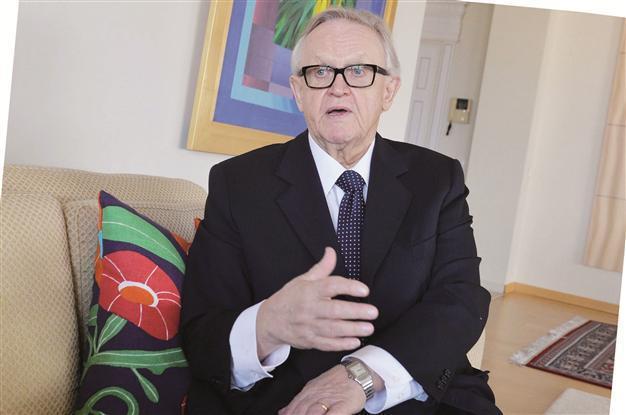Finnish mediator Ahtisaari ‘turned down’ Kurds’ mediation offer
Sevil Erkuş ANKARA – Hürriyet Daily News

'Very often, governments do not want to have any outsiders involved, or they do not want to internationalize the issue,' Ahtisaari tells the Hürriyet Daily News on Nov. 18. Hürriyet Photo / Fahir Arıkan
Finnish peace mediator Martti Ahtisaari has said the Kurds contacted him to play a mediation role in the Kurdish conflict years ago, but he did not respond at the time due to the Turkish government’s hesitance over foreign involvement in the process.“Very often, governments do not want to have any outsiders involved, or they do not want to internationalize the issue,” Ahtisaari told the Hürriyet Daily News on Nov. 18.
The former Finnish president and international mediator won the 2008 Nobel Peace Prize for his conflict resolution work around the world, and was in Ankara for a symposium.
He said the imprisoned leader of the outlawed Kurdistan Workers’ Party (PKK), Abdullah Öcalan, suggested him as a member of the “council of wise men” back in 2010, referring to the group aiming to contribute to efforts to end the decades-long Kurdish problem.
Asked about the PKK’s recent demand for an international mediator, or “third party,” for the peace process, Ahtisaari recalled the Turkish government’s previous hesitance over outside involvement in efforts to resolve the Kurdish question.
“Over the years, there had been some contacts by Kurds with my organization, whether from Iraq or from Turkey, but it did not lead to any action from our side. We receive many requests, there isn’t any problem in the world that hasn’t touched us. But this [not taking action] does not mean that we don’t get involved. It’s very important to take a hard look and see if there is something that we can do. But very often governments do not want to have any outsiders involved or do not want to internationalize the issue,” he said.
“You always have to look very carefully. The worse thing would be to force yourself into a process when one party or the other does not want it,” Ahtisaari noted.

Finnish peace negotiator Martti Ahtisaari speaks to the Hürriyet
Daily News' Sevil Erkuş.
According to Ahtisaari, the continuation of peace negotiations despite regional difficulties is very important. “Only by talking will you finally emerge [from problems],” he said.
In a reference to the protests in Turkey in October in solidarity with the Kurdish-populated city of Kobane in Syria, Ahtisaari stressed that the peace process would be influenced by regional developments.
“What happens here, in these issues, is also influenced by what happens in the neighborhood. Now we have extreme elements in the region and they are causing problems. This does not make it any easier to deal with domestic issues. I understand that talks are continuing and hopefully these issues can be settled,” he said.
UN should organize elections in Syria
Meanwhile, Ahtisaari also touched on the broader situation in Syria, saying that if the recent “action plan” of the U.N.’s special representative to Syria, Staffan de Mistura, for a cease-fire in Aleppo can serve as a step toward a wider solution to the ongoing war, then elections in Syria should be organized under the mandate of the U.N. secretary general in due course.
“If the mandate is given to the secretary general, elections should wait for at least a year and a half for things to calm down and for everyone to organize properly, so that we have fair parliamentary elections,” he said.
“Elections should not be held as quickly as they were in Egypt. That simply brought the military to power. None of the original groups that actually started the [Arab] Spring are there. They did not have any countrywide organization and did not have a chance. Everyone knewthat if you have elections quickly, the Muslim Brotherhood would win, but now the military has more power than it had in the [Hosni] Mubarak era,” the former Finnish president said.
Ahtisaari also expressed his objection to outside military intervention in Syria and said he was “desperately looking for political and peaceful settlement.”
“If we think that the only way is to use military means in Syria, we will see hundreds and thousands of people killed,” he said.
















